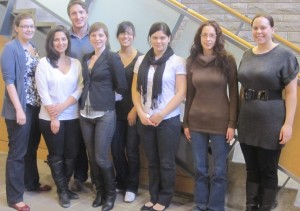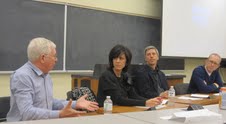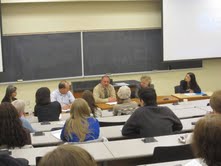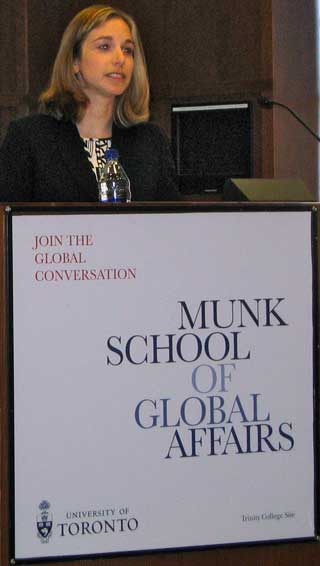
Members of the Queen’s CLAIHR team (from left): Kristen Allen, Chantel Levy, Allan McGavin, Brittany Sargent, Christine Dowling, Nicole Walton, Natasha Engineer, Courtenay Simmons
Over March 18 and 19, 2011 the Queen’s University CLAIHR and Canadian Lawyers Abroad Student Chapters hosted CLAIHR’s 9th Annual International Human Rights Film Festival. The theme of this year’s festival was Children’s Rights.
Students screened three documentaries, on children in India, child soldiers in rural Uganda, and the challenges faced by youth in the Jane & Finch area in Toronto.

Saturday morning panel for “Uganda’s Haunted Children” (from left): Professor Stanley Corbett, Professor Melanie Adrian, Dr. Walter Dorn, Professor Darryl Robinson
After each film we hosted speakers. We welcomed Katherine Fournier from Beyond Borders and Catherine McKenna, Co-founder and Executive Director for Canadian Lawyers Abroad, Dr. Walter Dorn, a professor at Royal Military College in Kingston and at the Canadian Forces College in Toronto, Melanie Adrian, professor at Carleton University, and Queen’s Law professors Stan Corbett and Darryl Robinson.

Saturday afternoon panel for “Lost in the Struggle” (from left): Leanne Wight, Professor Nicholas Bala, Daren Dougall, The Honourable Landon Pearson, Saadya Hamdani
Our Saturday panel included the Hon. Landon Pearson, a long-time advocate for the rights and well-being of children, Saadya Hamdani, Advocacy Specialist at UNICEF, Daren Dougall, Executive Director of the Youth Diversion Program in Kingston, Queen’s Law Professor Nicholas Bala, and Leanne Wight, the Supervisory Duty Counsel at the Family Court in Kingston.
Queen’s CLAIHR hosted almost 140 attendees at the two day festival, raising $230.43 for the World Food Program in North Africa.






